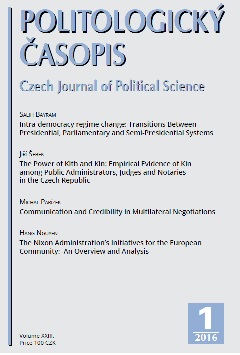Communication and Credibility in Multilateral Negotiations
Communication and Credibility in Multilateral Negotiations
Author(s): Michal ParízekSubject(s): Politics / Political Sciences
Published by: Masarykova univerzita nakladatelství
Keywords: multilateral negotiations; World Trade Organization; Doha development agenda; international trade; interest articulation, domestic politics
Summary/Abstract: Multilateral negotiations form the basis of much international cooperation, but the hurdle of reaching agreement often proves insurmountable. One prominent example of such negotiations is the Doha round of trade liberalization talks in the World Trade Organization (WTO). The round has already lasted more than fourteen years but, so far, has fallen short of its original ambition. This article identifies one possible reason why multilateral negotiations such as those of the Doha round face difficulties, namely the dysfunctional communication among states. I contend that a state’s ability to effectively articulate its interests is inhibited when its interests are dispersed across a number of issues under negotiation rather than focused on one or two primary areas. For straightforward domestic political reasons, a state that pursues multiple interests in negotiations will have difficulty in credibly communicating its position to other participants. This decreases the efficiency of negotiations, creates delays, and may lead to negotiation deadlock. I test this proposition with the use of a newly collected dataset of coded public statements by representatives of WTO member states at the eight ministerial conferences between 1996 and 2011.
Journal: Politologický časopis - Czech Journal of Political Science
- Issue Year: XXIII/2016
- Issue No: 1
- Page Range: 44-64
- Page Count: 21
- Language: English

